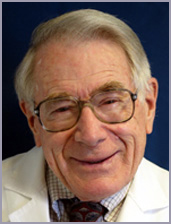William Connor, MD
1921 — 2009

William Connor, an expert on atherosclerosis, nutrition and lipid metabolism, has spent much of his career in Iowa and Oregon. He discovered an aptitude for research during his service in the Army Signal Corps and then took his MD at the University of Iowa in 1950. He recounts: “I got interested in atherosclerosis when I was a resident in Iowa City at the University at the VA Hospital because we had patients that had coronary disease and nobody knew much about it. They didn’t even have much to offer except nitroglycerin and if they collapsed in arrhythmia injecting adrenalin in the heart. That was the state of affairs.” Connor worked at the University of Iowa Medical Center until 1975, when he took a position at the Oregon Health Sciences University as professor of endocrinology, diabetes and clinical nutrition.
Connor’s interest in nutrition led him to investigate broadly the relationship between diet and serum lipids, in clinical, experimental and population studies. He consistently championed the particular role of dietary cholesterol in elevating blood lipids, based on his analysis of the literature and his careful dietary studies. He has focused in recent years on the role of omega-3 fatty acids in thrombosis, atherosclerosis and arrhythmias.
A pioneer contribution was setting up the Muscatine Study, which tracked CVD risk factors in children of a small Iowa town. His wife, Sonja Connor, an epidemiologist and clinical researcher, has collaborated in a study of the diet and health of the Tarahumara people of Mexico, finding that feeding them a Western-style diet for even a short time raised their blood lipids and risk of CVD.
Translating and disseminating results of nutrition research to the public has been a theme: “How are we going to prevent sudden death from the public health point of view? There is nothing out there except preventing coronary disease. But the use of fish oil in the coronary-susceptible person might well prevent the arrhythmias. So I think it has public health implications.” He and Sonja also co-authored several popular cookbooks and a helpful analysis of the “French Paradox,” the apparent disparity in diet, blood lipids and heart attack rates between France and its neighbors. Sonja survives him and works at the Univ. of Oregon in Portland. (SF/HB)
Sources
Connor, William in an Oral History Interview conducted by Henry Blackburn, September, 2002. History of Cardiovascular Epidemiology Archive, University of Minnesota.
University of Iowa Medicine Alumni Society Interviews: William Connor.
http://www.medicine.uiowa.edu/alumni/interviews/williamConnor.html
Retrieved April 15, 2006.